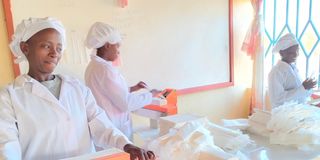Unique initiative that’s keeping Tharaka girls in school

Workers make sanitary pads at a firm owned by St Peter's Life-Line, a community based organisation in Tharaka Nithi County. The organisation distributes the pads for free to all girls in primary and secondary schools in Igambang'ombe Sub-county.
What you need to know:
- An organisation in Tharaka Nithi County has come up with a programme that supports girls to pursue education.
- In March this year, they set up a factory that manufactures disposable sanitary pads, which they distribute to all schools in the sub-county, for free.
Education is a key element in the fight against retrogressive practices like Female Genital Mutilation (FGM) and other vices that have hindered girl-child empowerment globally.
Tharaka Nithi County is among regions in the country where cases of FGM, teenage pregnancies and early marriages are rampant, especially in the semi-arid areas where poverty rates are high.
To ensure that girls are empowered, St Peter’s Life-line, a community-based organisation operating in Igambang’ombe Sub-county in Chuka/Igambang’ombe Constituency, came up with a programme that supports girls to pursue education.
After several years of observation, Veronica Nyaga, the founder and director of the organization realized that girls dropped out of school after attaining their teenage years, and the few who remained, performed dismally and had a low self-esteem.
She established that most girls dropped out once they started experiencing their menses because their parents could not afford to buy them sanitary towels.
Some girls stuffed pieces of old cloth and in case the blood soiled their dresses, they quit school completely due to the embarrassment that comes with it.
“After dropping out, the girls would be ‘cut’, then married off at a very tender age,” Ms Nyaga told Nation.Africa during an interview.
Manufacturing plant
She vowed to offer a solution by providing school girls, in the entire sub-county, with free sanitary towels. Buying the commodity from local shops would not have been sustainable given the cost implications. She thus, in collaboration with her financiers, set up a sanitary manufacturing plant near Kajuki market.
The plan was to roll out production in early 2020. This was not possible following the Covid-19 pandemic and travel restrictions, especially in Europe where she hoped to get raw materials and financing.
In March this year, the factory was set and she started making disposable sanitary pads, which she distributes to all primary and secondary schools in the sub-county.
As a result, she told Nation.Africa, cases of school dropout among girls drastically reduced and they have started gaining self-esteem.
“Girls are now confident even in class; those who missed a whole week during their menses now remain in school and can comfortably walk around without fearing embarrassment,” she said.
The firm has six members of staff who make an average of 1,020 pieces per day, and package them in packets of 12 pads each.
They have so far, made more than 10,000 pieces and the financial partners are ready to continue with the support for an unlimited period of time.
Raw materials
She said there is a consistent supply of raw materials but encounter the challenge of transporting the pads to schools located several kilometres apart from each other.
“We appeal to the county government to partner with us by providing a vehicle to transport the pads. We have the capacity to even produce for school girls in the entire county,” she said.
Kajuki Location chief, Simon Maingi said the sanitary pads programme has retained girls in school and cases of teenage pregnancies had also dropped.
He said desperate girls no longer expose themselves to infections by using old clothes during their menses.
“The sanitary pad programme has given our girls dignity and enabled them to remain in school even when they are experiencing menses,” said Mr Maingi, who is also the chairman of the organisation’s board of management.
Kajuki Primary School head teacher Joseph Mwathi, said the pads are adequately supplied and lauded the organization for the initiative.
He said girls in the school are ever active even during sports unlike before when they kept off to avoid embarrassment during their menses.





